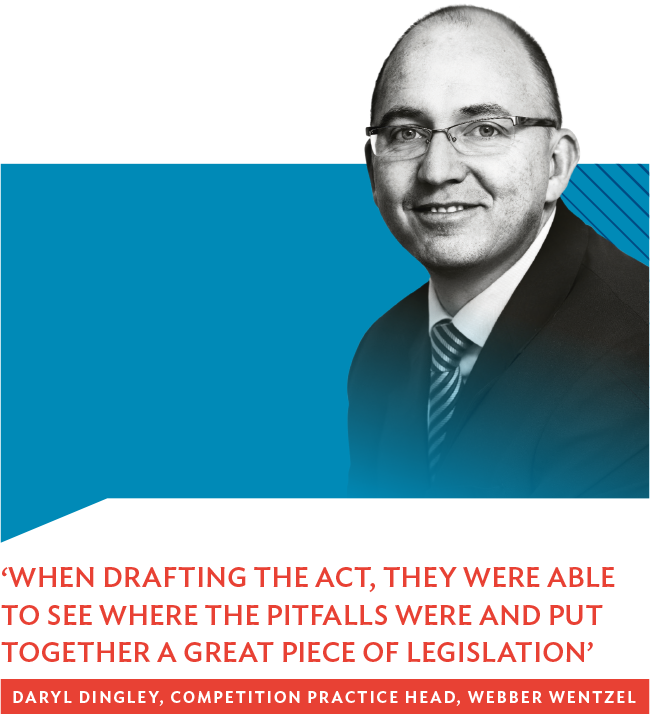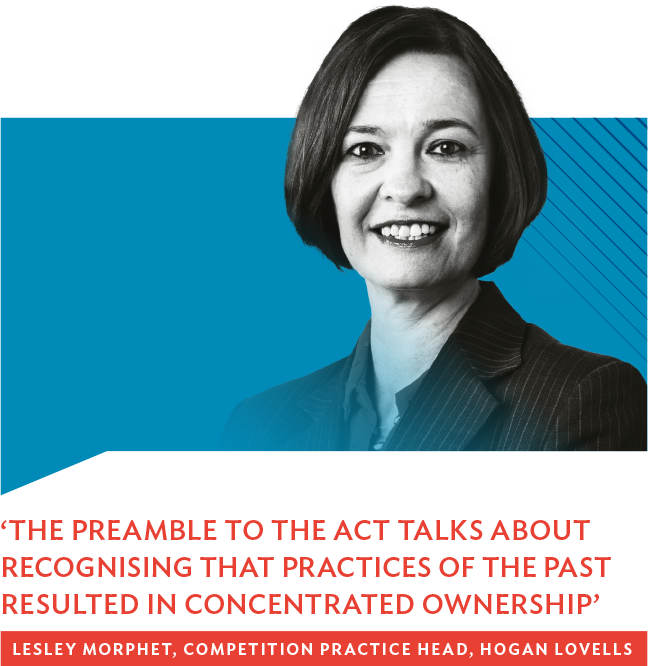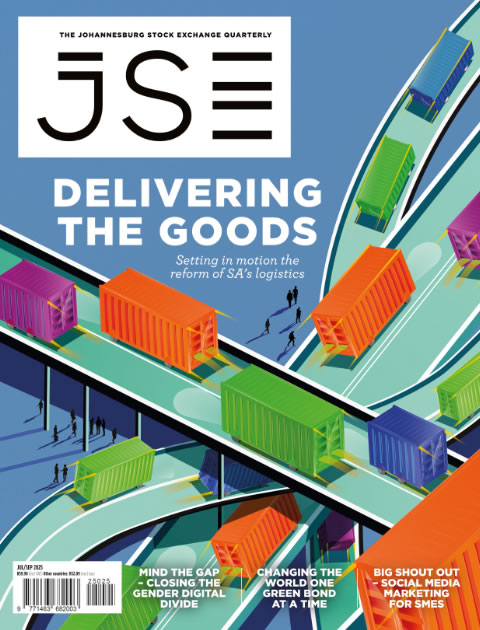Fair competition speaks of the creation and maintenance of a level playing field – one that affords access to business opportunities while simultaneously protecting consumer welfare through a greater choice of quality products and services available at the best prices. The predominant legislation in SA pertaining to fair competition is the Competition Act, which has been in force since 1999. Last year May, criminal sanctions for certain anti-competitive behaviour were introduced with the hope that this would help address the ongoing issues around cartel conduct.
‘What underpins the Competition Act is the principal of effective competition, which is what drives a lot of the important efficiencies that you need for a proper, functioning economy,’ says Daryl Dingley, head of the competition practice at Webber Wentzel. ‘With the big stick of a competition regulator ensuring effective competition, you’re going to have improved productive, allocative and dynamic efficiencies, which lead to a better-performing economy.’
Lesley Morphet, head of competition at Hogan Lovells adds that ‘the preamble to the Competition Act talks about recognising that practices of the past resulted in concentrated ownership and control of the economy, and how the economy should be opened up to a wider spread of ownership’.
Dingley believes the country’s Competition Act has been well drafted. ‘I think that our act is like our Constitution in the sense that, when it was drafted, those who were responsible drew from the best existing pieces of legislation from all over the world and consolidated certain elements to produce this new instrument,’ he says. ‘When drafting the act, they were able to see where the pitfalls were and put together a great piece of legislation.’
The provisions of the Competition Act are enforced by the Competition Commission. Jason van Dijk, a director and competition lawyer at Norton Rose Fulbright South Africa, describes the commission as one of SA’s more effective regulators. ‘The commission has successfully secured some very significant behavioural conditions and financial penalties being imposed on firms that have engaged in anti-competitive conduct, to the extent that I believe the amount of revenue generated for the fiscus by the regulator is second only to SARS,’ he says.
Is the Competition Commission an effective organisation? ‘If it wasn’t before, it definitely is now,’ according to Candice Holland, director at Deloitte’s risk advisory practice. Since the start of 2016, the commission has investigated 393 mergers – unconditionally approving 353, conditionally approving 32 and prohibiting five, with three cases being withdrawn, she says. It also investigated 17 banks that were allegedly involved in a forex trading cartel, and one in cancer medicine prices. ‘While undertaking the aforementioned, the commission still had time, by way of example, to charge at least one industry for cartel conduct; went after meat suppliers for price fixing; boat operators for colluding in the Robben Island museum tender; and Free State companies for colluding in a provincial treasury tender,’ she says.
‘Furthermore, in August 2017, the commission laid 649 charges of collusive tendering against the transport industry. There can thus be little doubt that efforts of the commission have had a chilling effect on anti-competitive behaviour.’
Van Dijk says that, while the commission is well resourced, there are areas for improvement. ‘Over the years, the commission has learnt some hard lessons but it has responded to this in a proactive and remarkably phoenix-like fashion. The commission is actively engaged in policy development through the facilitation and encouragement of academic debate and simulation, and – by working through the Department of Economic Development – has ensured that policy development and the necessary legislative changes have been made.’
Dingley agrees that the commission has a ‘very good record of prosecutions’. He argues, however, that it is stretched from a capacity perspective. ‘Consequently, they aren’t focusing on things in the way that they should be. I think they should be more selective in their prosecutions and investigations. Many cartel matters have been running for several years – a consequence of them taking on new work and not finishing matters already on their plates. Competition regulators in the US and Europe are more selective in terms of what they prosecute.’
According to Graeme Wickins, competition sector director at Werksmans Attorneys, several significant cases of anti-competitive behaviour have recently come before the competition authorities. ‘The biggest, in terms of financial penalty paid by one firm, remains the settlement agreement entered into between the Competition Commission and ArcelorMittal South Africa, which resulted in a penalty of R1.5 billion for anti-competitive conduct,’ he says. Regarding a case that had an immediate impact on consumers, the biggest of these was probably the commission’s investigation and prosecution of those firms involved in the bread, milled wheat and white maize cartels, says Wickins.
‘The largest penalty imposed on a participant of the cartel was a cumulative amount of R500 million, which Pioneer Foods agreed to pay to settle several cases, including claims that it fixed prices for flour and maize in South Africa. The settlement with the Competition Commission resulted in Pioneer paying R250 million as a financial penalty while also being required to spend another R250 million to establish the Agro-processing Competitiveness Fund, through which the IDC was to offer favourable financing to small and mid-size businesses in the food industry.
‘In addition, Pioneer agreed to adjust its prices to the market for flour and bread downward over a set period, thereby lowering its gross margin, and furthermore committing to increased capital expenditure,’ says Wickins.
The penalty for companies found guilty of price fixing or cartel behaviour is severe, with fines of up to 10% of annual turnover – equating to a sizeable chunk of profits. The recent introduction of criminal sanctions means that managers and directors found guilty of having engaged in cartel behaviour or who knowingly acquiesced with a firm engaging in cartel behaviour can face up to 10 years in jail, a fine of up to R500 000, or both.
‘As a developing country, we have an astronomical number of cartels,’ says Dingley, who believes there are several reasons for this, namely a competitiveness issue; structural issues in the economy lending themselves to collusion; and that many of SA’s industries were effectively legitimised cartels because of how they were previously regulated.
Asked whether he thinks SA has a problem with cartel activity, Van Dijk responds in the affirmative. ‘Cartels are very detrimental to the economy, particularly for consumers, who are ultimately the ones who suffer at the hands of the cartelists,’ he says. ‘Historically, given the nature of where our economy has come from, industries have lent themselves to being highly concentrated, which renders markets prone to cartel conduct.’
Morphet has a different opinion regarding whether the country has a problem with cartels. ‘I think if you asked the commission, they’d say yes. But I’m not sure I’d agree,’ she says. ‘Some behaviour that they categorise as cartel behaviour, I’m not sure that it is correctly categorised as such, and could be more appropriately looked at under a different section of the act. For example, in certain circumstances, such as in a joint venture, certain conduct may be categorised by the commission as cartel conduct because it is an agreement between competitors, whereas it may merely be sensible business behaviour. They categorise it very rigidly. Also, they say they have uncovered, say, 600 cartels but it might just be one overarching cartel that has manifested itself in 600 instances. This creates the perception that there
are more cartels than there in fact are.’
As far as cognisance of the law goes, Holland says companies are more aware than ever of the need to take proactive steps to reduce the chances of their employees engaging in anti-competitive practices. ‘What we are seeing as a response from clients is organisations undertaking comprehensive and ongoing training and educational efforts, such as competition law e-learning for their employees, workshops for their executives on what constitutes allowable information exchanges with their competitors, and anti-competitive due diligences on company practices,’ she says.
In terms of deterring cartel behaviour, Dingley argues severe sanctions are key. ‘Tied to this is the fact that people want to know that they’re protected, and want a degree of certainty following their co-operation in cartel matters,’ he says. ‘With the current corporate leniency policy, it’s not quite clear whether you’re going to get leniency from criminal prosecution if you’re willing to co-operate.
‘As a large law firm, we’re finding that the number of parties approaching us in relation to corporate leniency applications is declining because they aren’t sure of the level of protection they will receive. The law is not clear and the commission has not yet clarified this.’
Van Dijk adds: ‘As yet, we have not seen a criminal prosecution take place, so it’s an interesting space to watch.’










